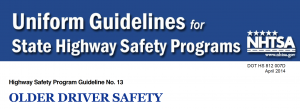Education for Medical Providers
The Demonstration project had two major objectives
1.) Education medical providers about identifying and reporting medically-at-risk drivers.

Guideline No. 13
Guideline No. 13 recognizes the importance of the driver licensing authorities’ (DMV) to legally restrict or suspend an individual’s license, especially if an individual has a medical condition that affects their driving capacities. Specifically, the Guideline encourages DMVs to make individualized determination of fitness to drive, based on the review and assessment of an individual’s capacities to safety operate the motor vehicle. Further the Guideline recommends the state to establish a Medical Advisory Board (MAB) (also called Unit or Program) consisting of medical professionals with the medical expertise in the review of medically-at-risk drivers.
In North Carolina (NC), the Medical Review Unit Program mission is to evaluate the driving fitness of individuals with medical conditions that adversely affect their ability to safely operate a motor vehicle. Click here for a description of the medical review process for North Carolina
Rational for developing Making The Call
First responders, like law enforcement officers, are called into service when a citizen of their city or county is in a crisis. In general, first responders are called to a crash to transport individuals to the hospital or respond to a medical emergency (e.g., heart attack, injury) at home or business.
However, there are times when the first responder is called for an individual that does not have a clear physical issue but appears to be impaired cognitively – after ruling out alcohol/drug impairment. This becomes a safety concern to the public if the individual refuses to be transported to the hospital and clearly intends to immediately drive a motor vehicle.
Unlike law enforcement, first responders do not have any legal jurisdiction to stop the person from driving. However, this form allows them to report their concerns about the medically-at-risk driver to the appropriate office of the NC DMV, the program that deals with medical conditions.
This video was funded by the NHTSA, therefore anyone is free to use the video and educational handout. Please contact Anne Dickerson if you want to get the video or additional information.
